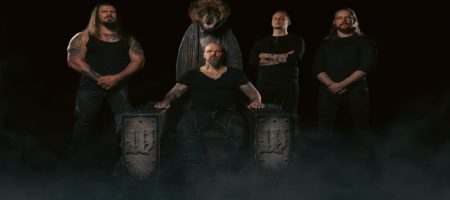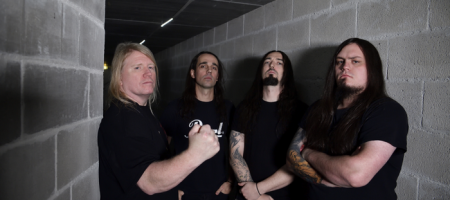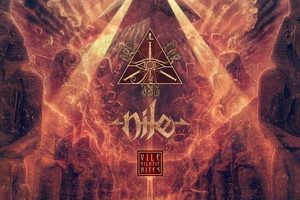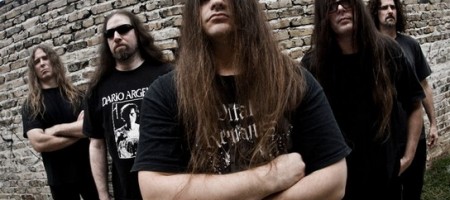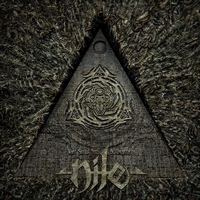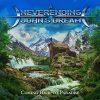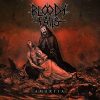Nile – Identity is Everything
Sunday, 2nd August 2015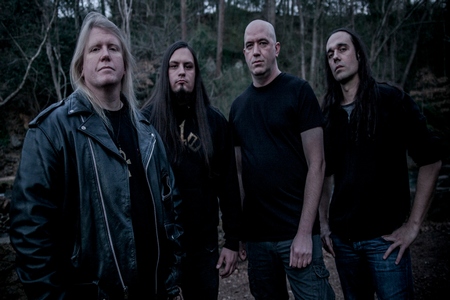
Death metal in 2015 is a vastly changed landscape than its humble beginnings. The sheer volume of bands that are available for public consumption has surged incredibly since the inception of the Internet. Because of this, it’s harder and harder to have a band that is indescribably your own. Most bands that can claim that status have been doing their thing for a significant amount of time. South Carolina’s Nile is one band that has been able to achieve much in their lifetime – and a sound that is quickly identifiable.
Nile’s Egyptian imagery and themes have been the band’s calling card since inception, and the upcoming What Should Not Be Unearthed is no different. But there are certainly some changes (which we detail below), which are for the better. What Should Not Be Unearthed is one of Nile’s most playful/fun sounding albums in years, giving off a feeling of genuine death metal excitement. While sitting around waiting for some new tires, I got a call from vocalist/guitarist Karl Sanders (who quipped that my choice of cheap new tires was ‘pretty metal’). We discussed the changes to death metal over the years, the importance of identity, how PC society has become, and much more…
Dead Rhetoric: The sound of What Should Not Be Unearthed is notably raw, especially compared to some of your more recent material. Why’d you choose to go in this direction?
Karl Sanders: We definitely wanted a heavier sound this time. Our last album [At the Gate of Sethu], in retrospect, was overly clean and surgical. It was technique oriented and super-clean. This time we wanted something big and huge and pyramid-sized. A lot of big, heavy guitar on the new record.
Dead Rhetoric: There’s also a notable push in the brutality front. How do you balance the delicate line of brutality versus technicality?
Sanders: That’s a great question. I think it’s the eternal question for a band playing our genre. How do you balance playing technical music, but manage to keep it fucking heavy. What we did this time around, we adopted a kind of anti-technique approach. My thoughts were, as I was writing the songs, that there was a criteria for which riffs, and what to go with – the riff doesn’t have to be technical. It doesn’t matter if it is impossible-hard and technical or if it was simple and catchy. What matters is does it have feeling, and is it heavy? That was the criteria.
Dead Rhetoric: So did it make it less stressful to write in the fashion?
Sanders: It was incredibly liberating. I think Dallas [Toler-Wade] and I both discovered that this was the most fun record we’ve ever made. There was a much lower stress factor than say, At the Gate of Sethu or Those Whom the Gods Detest, which were very stressful, mind-raping records to make. I think after each of those two records, I was very mentally unhealthy. Whereas What Should Not Be Unearthed, it was a fun thing. We had a lot of fun with this record, and I think it really shows. When you put this record on, it’s a pleasure to listen to, and it’s fun. You can actually feel the vibe of the band in the songs – these are guys just having fun playing death metal.
Dead Rhetoric: I’ve followed Nile since Nephron-Ka and have always held that record in a certain regard. I feel like the new album feels the most akin to that album in some ways.
Sanders: I think spiritually, it’s from a place that’s a cousin of it. With Nephron-Ka, we were very drunk with the possibility of making music. The joy of doing something, and making our first record. Life was an incredible adventure back then. There were no chains upon us. We were full of the joy of being metal. A little bit of that spirit is in this new record for sure.
Dead Rhetoric: Many bands start with writing the music and then adding lyrics. Nile usually does the opposite. What benefits do you gain by starting with the lyrics?
Sanders: When you start with the words and you let the words be the guide, your entire phraseology is reversed. When you have the music first, it limits you as to the vocal phrasings and the vocal meter that you can utilize. It ties your hands a little bit. It almost kind of dictates – your vocals have to work with the riffs. Automatically your hands are limited to what will work with that particular guitar rhythm. If you start with the lyrics first, you have flipped it around. You can do whatever you want with those vocal phrasings. That, in turn, creates different possibilities for guitar parts working with those works. Since I’m a guitar player, I can pretty much find a riff that I can make work with any vocal phrase, no matter how fucked up it is.
Certainly with Nile, working with the subject matter we do, the vocal phrasings are inherently different than a lot of other bands are writing. It lends itself to approaching it from a different album, which I think has contributed us to having our own kind of identifiable sound and way of doing things. Because each set of lyrics is different, it makes each way of writing that song unique in and of itself. To me it’s liberating – I don’t feel compelled to do the same old thing every time. I write whatever lyrics I think need to go there, or work with whatever texts and I make the guitar deal with it. It’s just wonderful fun and incredibly liberating to work that way.
Dead Rhetoric: I know Egypt is an area of interest for you personally – how much in-depth research do you do with each album before things really take off?
Sanders: I take it one song at a time. It would be too much to tackle to research a whole record and then write the songs. I take each little song at a time and research what I need to do for that song. That’s a bit size piece that is achievable.
Dead Rhetoric: Back when the band started, the Internet wasn’t like it is now. Has the onset of the Internet aided in helping your research times?
Sanders: It does make some aspects of it easier, but is it less time-consuming? Well, I think because having the Internet at your disposal, it often leads you down many roads and paths that go nowhere. There’s quite a bit of wasted time when you do that. I have noticed though – one thing I did for one of the songs. I had the idea for the song and a title, so I just googled the title. I found an incredible amount of information pop up in my search. I went, “Holy fucking shit, it’s almost as if the song has been written for me.” All I had to do was grab the fishing rod and reel it in.
Dead Rhetoric: Nile has always been a consistent band in terms of your works. What’s your secret?
Sanders: You could look at that several ways. By some ways of looking at it, you could say we are consistent. In other ways, you can say there are radical differences between each one. I don’t think there’s a formula to Nile, other than we actually put the time in and do some hard work to do what we do. If there’s any lesson to be gleamed from Nile, it’s that it doesn’t matter where you come from – you can come from a shitty place like South Carolina – but if you work hard and you are talented and put the time in, you can make some music, and some music that will someone will actually care about.
Dead Rhetoric: Does it get harder, songwriting-wise, with each new album, in keeping things up to the Nile standard of what you want to see in an album?
Sanders: No, I don’t think so. I don’t really know or understand what record we are making until we start making it. I think that the years spent doing what we are doing has given us a certain experience and wisdom hopefully. You don’t do something for 20-something years and not learn something from experience along the way. That would be very unnatural. Hopefully the time spent working hard counts for something. When I think of bands like Immolation – here are some guys who have been working on their style for a couple decades now. They do incredible things, Immolation is an incredible band. I have to think that the wisdom and experience gained by being in that band has to count for something. It has to – it does. When I put on an Immolation record, I’m blown away. Would they be able to do that if they didn’t have all that time and passion invested? Well, probably not.
Pages: 1 2












